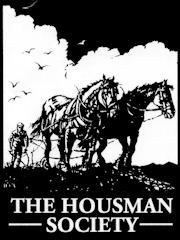A Shropshire Lad
|
ASL XVIII “To An Athlete Dying Young”
| Line | Word | Glossary |
| 11 | laurel | 1. A small evergreen tree that grows in southern Europe and has glossy aromatic leaves and dark purple or black berries. 2. The leaves of the laurel woven into a wreath and used as a mark of honor or victory in ancient times, for example, to crown the winners of athletic events |
| 17 | rout | 1. A noisy and disorganized group of people |
| Line | Text | Textual variation |
| 1 | d1 | time] <day> |
| 1 | d2 | your] <the> |
| 2 | d1 | <They> We chaired you <in> \ through / the market-place |
| 3 | d1 | Man and boy] <And while the crowd> \ < [?Where] market-folk |
| 9 | d1 | Smart] Wise |
| 9 | d1 | slip] steal |
| 9 | d2 | Smart lad,] Wise lad, \ Well done, / → |
| 10 | d1 | glory does] victory will |
| 10 | d2 | victory \ glory / will |
| 11 | d2 | <And glory for the runner braids> → And early though the laurel grows |
| 12 | d2 | <A chaplet briefer than a maid’s> It withers sooner \ lasts no <longer> better / than <the> \ a / rose |
| 13 | d1 | Shut [?your eyes and keep] them shut → Now the eye that night has shut |
| 13 | D2d1 | <He> \ The man / whose eye the night has shut → Eyes the shady \ cloudy / night has shut |
| 13 | D2d2 | <Now the eye that> \ Eyes the cloudy / night has shut |
| 13 | D2d3 | Eyes the night has filled with smoke |
| 14 | d1 | Cannot see the] And never see your |
| 14 | D2d1 | <Never sees his record cut> → Never \ Will never / see the record cut |
| 14 | D2d2 | Will never see the record cut |
| 14 | D2d3 | <Never> \ Will never / see the record broke [ → Cannot see the record cut ] |
| 15 | D2d1 | sounds no worse than] <is the same as> |
| 16 | D2d2 | After] <Now that> |
| 16 | D2d1 | the] <his> |
| 17 | D2d1 | <And> <n> Now you will \ <have> / \ shall / not joined \ <swelled> / \ swell / the throng No fear you now should join the throng |
| 17 | D2d2 | Now you will not] No fear you now should \ <Now you’ll never> |
| 18 | D2d1 | wore their honours out] lived \ stayed / a <day> \ spell / too long |
| 19 | D1 | Runners] Of runners |
| 20 | D1 | And] \ <Or> / |
| 20 | D1 | died] die<s>d |
| 21 | D1 | So now with ribboned breast invade <So, now with laurel<s> undecayed> \ <before the laurels fade> / \ <unbeaten, unafraid> / , \ So set, before its echoes fade, / |
| 22 | D1 | First in the race, \ Unbeaten yet, / the sill of shade, → <Set foot upon> \ The fleet foot on / the sill of shade |
| 23 | D1 | low] <dark> |
| 25 | D1 | that early-laurelled] your early-laurelled \ that young and laurelled / |
| 25 | D2d2 | that]<your> |
| 26 | D1 | flock to gaze] throng to gaze \ come and gaze / |
| 27 | D1 | find unwithered on] yet unfaded round |
| 28 | D1 | The] \ <Your> / |
| 28 | D1 | garland] garland<s> |
| Line | Question |
| 5 | How does the poet develop the contrast between the last time that the athlete was carried home shoulder-high and when that happens again, “To-day“? |
| 13 | Why do you think the poet changed the word “cloudy” from the drafts to “shady” in the final version? |
| 13-14 | It is clear from the drafts that Housman experimented a great deal with these lines. Consider the alternatives suggested in the drafts:
What are the merits of each and how is the final line, “Eyes the shady night has shut,” superior to the others? |
| 17 | Why do you think the poet returned in the final version to the word “swell“, which was replaced with “join” after the first draft? What different ideas does the word suggest? |
| 17-18 | Once again, consider the possible alternatives to these lines, formed from the various drafts:
What are the merits of each and how is the final line, “Now you will not swell the rout,” superior to the others? |
| 19 | The poet removes the repetition of the word “Of” at the beginning of the line and thereby shortens it by one syllable. What is the effect on the meaning and tone of this two-fold change? |
| Whole poem | This poem is one of a number that consider the untimely or early death of youth. What message do you think this particular poem carries? |

Top ▲ Commentary